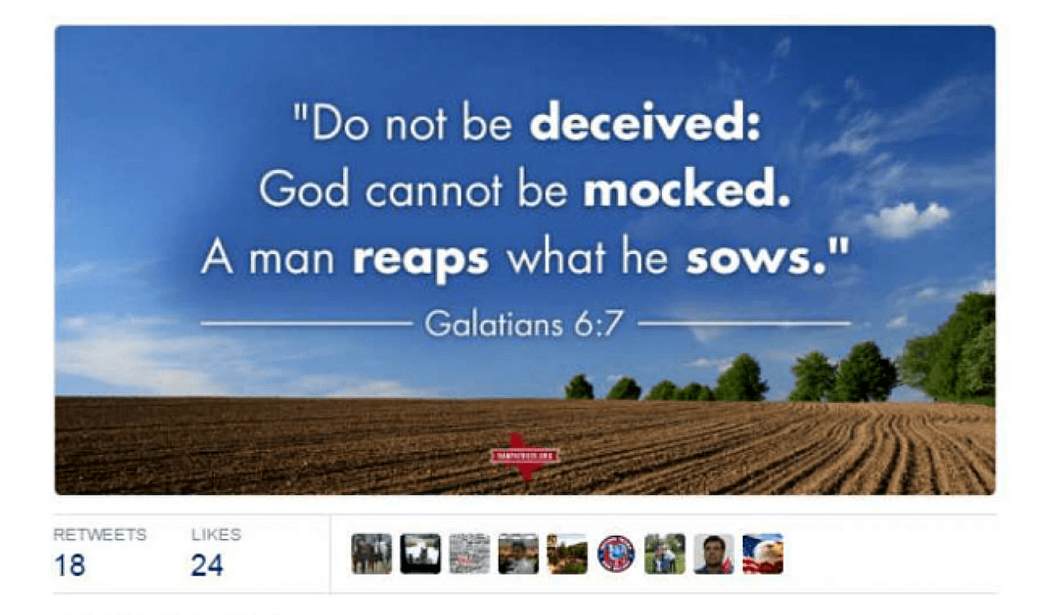I didn’t actually post the now infamous Bible verse tweet, but I so, so easily could have. Why? Because I’m a professional social media manager, and I, like the person who runs Dan Patrick’s account, regularly pre-schedule my tweets. What just happened to Texas Lieutenant Governor Dan Patrick sadly isn’t uncommon, but it is every social media manager’s worst nightmare.
So what exactly happened? At 7 a.m. on Sunday morning, this tweet went out from Texas Lieutenant Governor Patrick’s Twitter account:
This tweet wouldn’t have garnered much attention on most days. This isn’t even a particularly controversial Bible verse. But because most of Twitter was reacting to the tragic shooting that took place in Orlando less than 5 hours before, people immediately jumped to the conclusion that Patrick was insinuating that the victims of the shooting had gotten what they deserved. And suddenly, besides the actual shooter, Dan Patrick was the most hated man on the Internet.
But when Patrick’s team responded, they explained that the tweet had been scheduled days in advance. Furthermore, they explained that he had them post a Bible verse at 7 a.m. every Sunday morning. Dan Patrick was out of the country on Sunday and likely didn’t look at or even think about Twitter at all that fateful morning — until he found out he was one of the most hated men on the Internet.
It might surprise you to learn that this way of managing a Twitter account is completely industry standard. Most of the tweets that you see posted by politicians, celebrities, brands, non-profits, etc. are pre-scheduled by a PR person. That means they were written beforehand and set to post at the optimal time, so that we social media folk can live our lives without having to drop everything once every few hours to tweet.
This also means that we all live in fear of the one time that something happens in the world, making our otherwise innocuous tweet wildly inappropriate. On Sunday morning, after hearing the news, I myself was scrambling to unschedule posts. Among others, I had a tweet scheduled to go out out that talked about how an obscure piece of legislation could hamper emergency response times. If that had gone out Sunday morning, my organization probably would have gotten angry comments about how we were politicizing a tragedy for our own ends.
Similarly, a friend of mine recounted how she had a post scheduled for Sunday morning promoting an upcoming event in Orlando that included “#Orlando.” On any other day that tweet would have been totally innocuous. On Sunday, it would have looked at best bizarre and insensitive, and at worst like they were trying to use a tragedy to sell tickets.
Both of us unscheduled our tweets in time, but if either of us hadn’t checked Twitter that morning, it could have been either of us whose post ended up going viral, and not in a good way. It could have been either of our bosses who were villainized by no fault of their own. It could have been any church, ministry, or non-profit that had scheduled that Bible verse. And every time tragedy strikes, there’s always a similar victim of the same Internet witch hunt.
So, if it wasn’t Dan Patrick’s fault, why are people still so angry at him?
People want to be angry. They have a right — perhaps even a duty — to be angry when dozens of people are senselessly slaughtered. But wrongly accusing an innocent man is the exact wrong channel for that anger. Telling the LGBT community that not only were they targeted by a killer, but that the lieutenant governor of Texas said they deserved it only serves to make matters worse. And other escalations that followed — like telling Christians that one wayward tweet proves they’re all hateful bigots — did nothing to help anyone heal.
Instead, it assigns hate where there was none. It makes a group that constantly feels marginalized feel even further marginalized. It puts Christians and other people of faith further on the defensive. And it harshly punishes a man whose worst crime was thinking about something besides Twitter on a Sunday morning after a horrible tragedy.
I am sure there is some young social media manager in Texas having the worst week of his or her life right now. But if I met that person, I would give them a big hug and reassure them that this isn’t their fault, that going to church or sleeping in or whatever they were doing instead of being glued to Twitter that morning was okay. Let’s give that person a break. Let’s give Dan Patrick a break.
Most of all, let’s take heart, knowing that not every poorly placed tweet is driven by hatred. If we look for hate, we’ll convince ourselves that we’ve found it around every corner. But if we look for love, especially in times of tragedy, I bet we’ll find it much, much more.










Join the conversation as a VIP Member